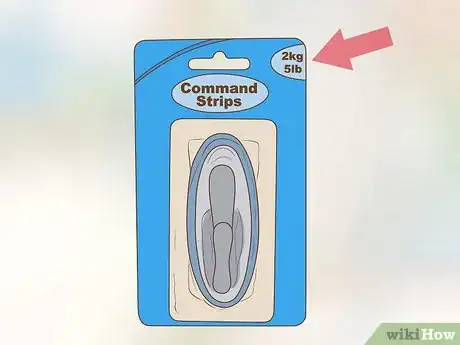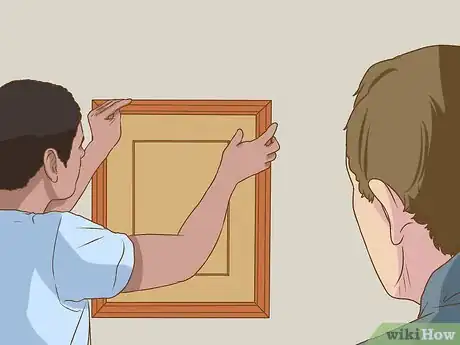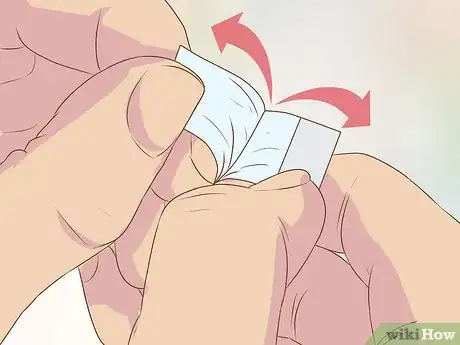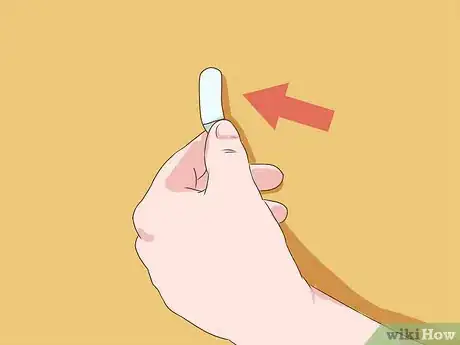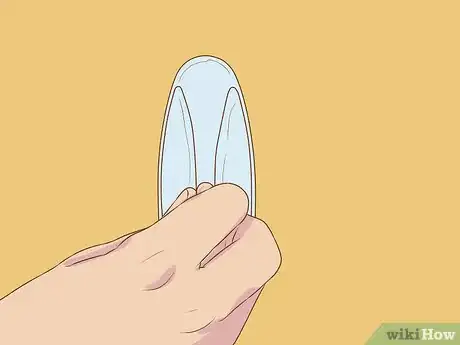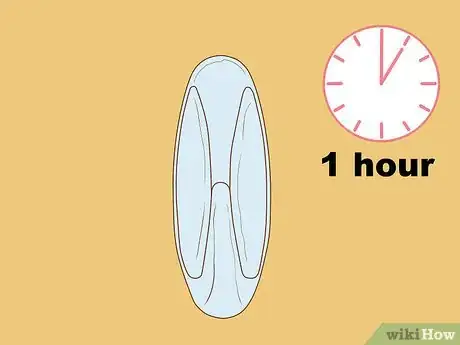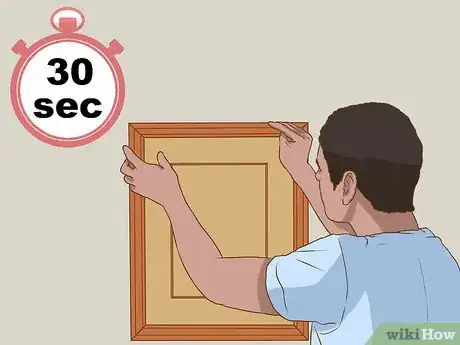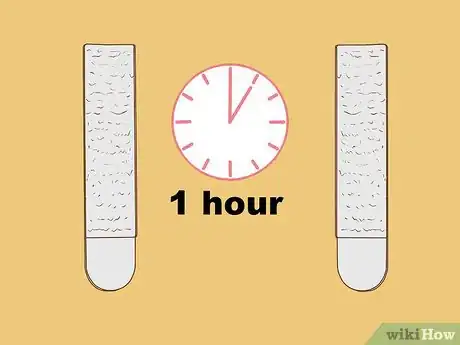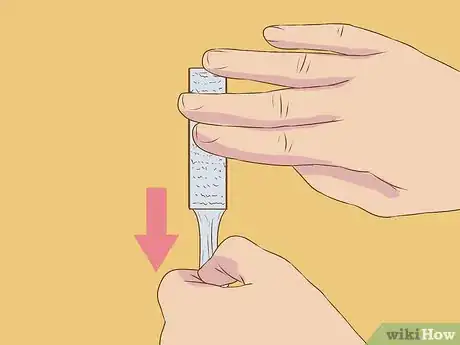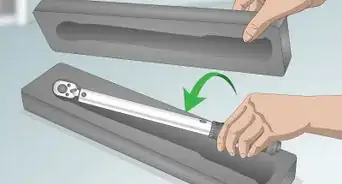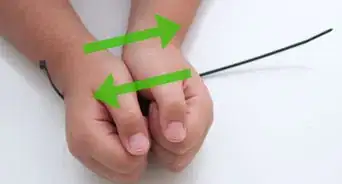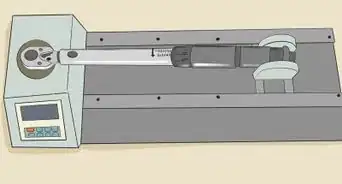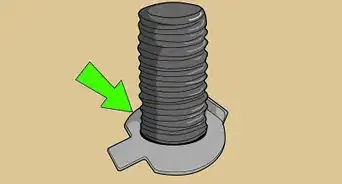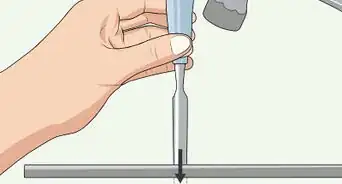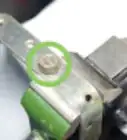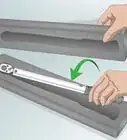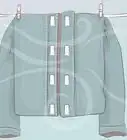This article was co-authored by Jason Phillip. Jason Phillip is a handyman specializing in mounting and hanging objects onto walls. With over five years of experience professionally mounting and installing objects through his company, Jason's Handyman Services, Jason's work includes working with mounting window AC units, designing art gallery walls, installing kitchen cabinets, and replacing light fixtures on drywall, brick, and plaster. He has been rated a "Top Pro" every year since 2016 by Thumbtack for being one of the highest-rated, most popular professionals on Thumbtack.
There are 13 references cited in this article, which can be found at the bottom of the page.
This article has been viewed 81,130 times.
Command Strips by 3M come in multiple types, including hooks with clear strips, other types of hooks, and picture hanging strips. Command Strip hooks can be used to hang a variety of lightweight items, such as keys, a clipboard, string lights or measuring cups. Make sure to choose a suitable surface, and clean it with rubbing alcohol before adhering your strips. It’s helpful to use a level and to ask a buddy to help you out when you’re determining where to hang items, especially if you’re hanging a picture or group of pictures you want to be straight.
Steps
Determining How to Hang Items
-
1Ensure the surface is suitable for the strips. You can apply Command Strips to metal, tile, glass, painted drywall, and painted or varnished wood.[1] Do not apply them to wallpaper, antiques, or valuable/irreplaceable items. Don’t use the strips to hang anything over a bed.[2]
- Avoid using Command Strips on vinyl, since they may not stay adhered.
- If you’re using hooks with clear strips, choose a smooth surface.
- To maintain adhesion, apply Command Strips to surfaces that stay between 50°F (10°C) and 105°F (40°C).
- Avoid hanging command strips directly above a heater since the heat could melt the adhesive and cause them to fall.[3]
- Command strips don't typically hold up well in humid environments, like in bathrooms.[4]
-
2Ensure the weight of items you’re hanging is acceptable. Check the package of your product to find its exact weight limit. If your items exceed the weight limit, consider other options such as screws and studs or a picture string.
- Command Strips come in a variety of sizes with different weight-bearing capacities.
- Depending on the product, 3M may advise that you use only one hook per item you’re hanging.[5]
Advertisement -
3Measure and mark the surface. Ask someone to hold up the item, if possible, so you can stand back and decide if the placement is satisfactory. Use a level to align a picture; if it’s a group of pictures, use a laser level. Place a sticky note sideways – like a kite shape – at the top center, above where your item will hang.[6]
- You may want to hang a picture 60 inches (152 cm) above the floor, or with its bottom edge six to eight inches (15 to 20 cm) up from a piece of furniture.
- For a group of items, cut paper patterns of their shapes. Use low-adhesive tape to place the papers on the wall and decide where you want the items to hang. Then place the corner of a sticky note at the top center of each paper, so that the bottom corner is your reference point.
-
4Clean the surface. Dampen a cloth with isopropyl rubbing alcohol. Gently wipe the surface where you plan to adhere the strips. Allow the area to dry.[7]
- Don’t clean the surface with household cleaning sprays or wipes. These leave a residue that can make the strip’s adhesion unsteady.
- Command strips won't stick as well if the surface you apply them to is dusty or dirty.[8]
Applying Hooks with Clear Strips
-
1Peel the strips apart, if applicable. If you have multiple strips, separate them by pulling them away from each other.[9]
-
2Peel off the black liner. Locate the black liner, marked “Wall Side.” Hold the unlined portion with one hand as you pull the black-printed layer off the strip.[10]
- You may need to use your fingernail under an edge of the liner to begin pulling it up.
-
3Attach the strip to the wall. Press the sticky side of the strip firmly onto the surface where your hook should hang. Press along the full length of the strip for 30 seconds.[11]
-
4
-
5Let the adhesive cure. Wait at least one hour before you use the hook. The adhesive needs time to fully bond to the wall. Its bond will not be as strong if the hook holds weight right away.[14]
Applying Hooks with Non-Clear Strips
-
1Separate the strips, if applicable. If you have multiple strips, pull the strips away from each other to separate them.[15]
-
2Attach the strip to the hook. Peel off the red-printed liner. Line up the strip, sticky-side down, with the plate on the backside of the hook. Press firmly along the length of the strip from the top downwards.[16]
-
3Adhere the hook to the wall. Peel the black liner off the strip. Press the hook strongly onto the surface where you want the hook. Hold the hook against the surface for thirty seconds.[17]
- Pressing the hook firmly allows the adhesive to bond securely.
-
4Remove the hook to secure the underlying base. Lift the hook up to slide it off its mounting base. Push the base strongly against the surface for 30 seconds.[18]
- Pressing the mounting base directly ensures that the adhesive will bond to its maximum strength.
-
5Allow the adhesive to cure. Reattach the hook to its mount by sliding it down onto the base. Don’t hang anything on the hook for at least an hour.[19]
- The adhesive needs time to set against the surface before holding any weight.
Applying Picture Hanging Strips
-
1Snap the strips together. Separate the strips by pulling them apart. Align the shapes of the strips, with the red labels facing outward on each side. Push the strips together until you hear a click.[20]
-
2Attach the strips to the back of the picture frame. Peel off one of the red (or green, depending on your product) liners. Place the strip sticky-side down onto the back of the frame. Press the strip down firmly.[21]
- Repeat this step for each strip you want to apply to the frame. For example, you may want to use two to four strips per frame.
- If you’re using four strips for a frame, put the lowest pair approximately two-thirds of the way down from the frame’s top.[22]
-
3Adhere the frame to the wall. Make sure all of the liners are removed. Push the frame against the wall strongly. Hold it firmly for 30 seconds.[23]
-
4Remove the frame to secure the underlying strips. Hold the bottom of the frame. Lift it gently towards you and upwards. Press the entire length of the strips for 30 seconds each.[24]
- Don’t yank the frame straight towards you, or you’ll loosen the strips instead of detaching the frame from the wall.
-
5Let the strips cure for at least an hour. Don’t reattach the frame until an hour has passed. Afterwards, align the frame’s strips with the strips on the wall. Push the frame until all of the strips have clicked into place.[25]
- Leaving the frame off of the wall for an hour gives the adhesive time to bond to the wall.
-
6Readjust the strips if needed. If the frame isn’t straight, you can remove one or more strips. Hold the bottom two corners of the frame and lift it up and away. Reposition the strip(s) as desired.[26]
- Hold the top of the strip you want to reposition with one hand. With your other hand, pinch the strip at the bottom and pull it downwards. Stretch it slowly, straight down – up to 15 inches – until the strip releases from the wall.[27]
Expert Q&A
Did you know you can get expert answers for this article?
Unlock expert answers by supporting wikiHow
-
QuestionCan I use command strips in a bathroom?
 Jason PhillipJason Phillip is a handyman specializing in mounting and hanging objects onto walls. With over five years of experience professionally mounting and installing objects through his company, Jason's Handyman Services, Jason's work includes working with mounting window AC units, designing art gallery walls, installing kitchen cabinets, and replacing light fixtures on drywall, brick, and plaster. He has been rated a "Top Pro" every year since 2016 by Thumbtack for being one of the highest-rated, most popular professionals on Thumbtack.
Jason PhillipJason Phillip is a handyman specializing in mounting and hanging objects onto walls. With over five years of experience professionally mounting and installing objects through his company, Jason's Handyman Services, Jason's work includes working with mounting window AC units, designing art gallery walls, installing kitchen cabinets, and replacing light fixtures on drywall, brick, and plaster. He has been rated a "Top Pro" every year since 2016 by Thumbtack for being one of the highest-rated, most popular professionals on Thumbtack.
Handyman
-
QuestionWhy are my command strips falling off of the wall?
 Jason PhillipJason Phillip is a handyman specializing in mounting and hanging objects onto walls. With over five years of experience professionally mounting and installing objects through his company, Jason's Handyman Services, Jason's work includes working with mounting window AC units, designing art gallery walls, installing kitchen cabinets, and replacing light fixtures on drywall, brick, and plaster. He has been rated a "Top Pro" every year since 2016 by Thumbtack for being one of the highest-rated, most popular professionals on Thumbtack.
Jason PhillipJason Phillip is a handyman specializing in mounting and hanging objects onto walls. With over five years of experience professionally mounting and installing objects through his company, Jason's Handyman Services, Jason's work includes working with mounting window AC units, designing art gallery walls, installing kitchen cabinets, and replacing light fixtures on drywall, brick, and plaster. He has been rated a "Top Pro" every year since 2016 by Thumbtack for being one of the highest-rated, most popular professionals on Thumbtack.
Handyman
-
QuestionCan I use command strips on a cement wall?
 Jason PhillipJason Phillip is a handyman specializing in mounting and hanging objects onto walls. With over five years of experience professionally mounting and installing objects through his company, Jason's Handyman Services, Jason's work includes working with mounting window AC units, designing art gallery walls, installing kitchen cabinets, and replacing light fixtures on drywall, brick, and plaster. He has been rated a "Top Pro" every year since 2016 by Thumbtack for being one of the highest-rated, most popular professionals on Thumbtack.
Jason PhillipJason Phillip is a handyman specializing in mounting and hanging objects onto walls. With over five years of experience professionally mounting and installing objects through his company, Jason's Handyman Services, Jason's work includes working with mounting window AC units, designing art gallery walls, installing kitchen cabinets, and replacing light fixtures on drywall, brick, and plaster. He has been rated a "Top Pro" every year since 2016 by Thumbtack for being one of the highest-rated, most popular professionals on Thumbtack.
Handyman
Things You’ll Need
- Level
- Sticky notes
- Measuring tape
- Scissors
- Paper
- Tape
- Cloth
- Isopropyl rubbing alcohol
- Command Strips
References
- ↑ http://www.command.com/3M/en_US/command/hooks-strips/
- ↑ http://multimedia.3m.com/mws/media/658770O/commandtm-instructions.pdf
- ↑ Jason Phillip. Handyman. Expert Interview. 2 July 2020.
- ↑ Jason Phillip. Handyman. Expert Interview. 2 July 2020.
- ↑ http://multimedia.3m.com/mws/media/658770O/commandtm-instructions.pdf
- ↑ https://www.familyhandyman.com/walls/level-hanging-hang-artwork-and-wall-hangings-straight-and-level/view-all
- ↑ http://www.command.com/3M/en_US/command/hooks-strips/
- ↑ Jason Phillip. Handyman. Expert Interview. 2 July 2020.
- ↑ https://www.youtube.com/watch?v=eQe_kJxCANo&feature=youtu.be&t=24
- ↑ http://www.command.com/3M/en_US/command/hooks-strips/
- ↑ http://www.command.com/3M/en_US/command/hooks-strips/
- ↑ https://www.youtube.com/watch?v=eQe_kJxCANo&feature=youtu.be&t=36
- ↑ http://www.command.com/3M/en_US/command/hooks-strips/
- ↑ https://www.youtube.com/watch?v=eQe_kJxCANo&feature=youtu.be&t=44
- ↑ https://www.youtube.com/watch?v=kA1jruY-94o&feature=youtu.be&t=6
- ↑ https://www.youtube.com/watch?v=kA1jruY-94o&feature=youtu.be&t=11
- ↑ http://www.command.com/3M/en_US/command/hooks-strips/
- ↑ http://www.command.com/3M/en_US/command/hooks-strips/
- ↑ http://www.command.com/3M/en_US/command/hooks-strips/
- ↑ https://www.youtube.com/watch?v=HJ9RZt0_qMk&feature=youtu.be&t=7
- ↑ https://www.youtube.com/watch?v=HJ9RZt0_qMk&feature=youtu.be&t=12
- ↑ http://www.command.com/3M/en_US/command/hooks-strips/
- ↑ http://www.command.com/3M/en_US/command/hooks-strips/
- ↑ https://www.youtube.com/watch?v=HJ9RZt0_qMk&feature=youtu.be&t=39
- ↑ http://www.command.com/3M/en_US/command/hooks-strips/
- ↑ https://www.youtube.com/watch?v=HJ9RZt0_qMk&feature=youtu.be&t=55
- ↑ http://www.command.com/3M/en_US/command/hooks-strips/


